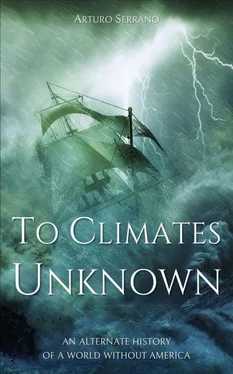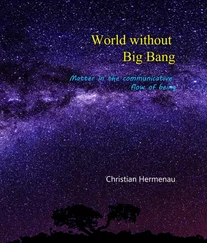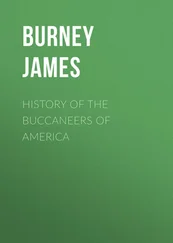Arturo Serrano - To Climates Unknown - An Alternate History of a World Without America
Здесь есть возможность читать онлайн «Arturo Serrano - To Climates Unknown - An Alternate History of a World Without America» весь текст электронной книги совершенно бесплатно (целиком полную версию без сокращений). В некоторых случаях можно слушать аудио, скачать через торрент в формате fb2 и присутствует краткое содержание. Город: Bogot,a, Год выпуска: 2021, ISBN: 2021, Издательство: Amazon, Жанр: Альтернативная история, на английском языке. Описание произведения, (предисловие) а так же отзывы посетителей доступны на портале библиотеки ЛибКат.
- Название:To Climates Unknown: An Alternate History of a World Without America
- Автор:
- Издательство:Amazon
- Жанр:
- Год:2021
- Город:Bogot,a
- ISBN:979-8-75808-648-3
- Рейтинг книги:3 / 5. Голосов: 1
-
Избранное:Добавить в избранное
- Отзывы:
-
Ваша оценка:
- 60
- 1
- 2
- 3
- 4
- 5
To Climates Unknown: An Alternate History of a World Without America: краткое содержание, описание и аннотация
Предлагаем к чтению аннотацию, описание, краткое содержание или предисловие (зависит от того, что написал сам автор книги «To Climates Unknown: An Alternate History of a World Without America»). Если вы не нашли необходимую информацию о книге — напишите в комментариях, мы постараемся отыскать её.
To Climates Unknown: An Alternate History of a World Without America — читать онлайн бесплатно полную книгу (весь текст) целиком
Ниже представлен текст книги, разбитый по страницам. Система сохранения места последней прочитанной страницы, позволяет с удобством читать онлайн бесплатно книгу «To Climates Unknown: An Alternate History of a World Without America», без необходимости каждый раз заново искать на чём Вы остановились. Поставьте закладку, и сможете в любой момент перейти на страницу, на которой закончили чтение.
Интервал:
Закладка:
Not a word was said during the long walk, but when they boarded the ship, the lady leaned to speak into his ear, “Don’t be afraid. Killing you is the farthest thing from their minds.”
He asked, feeling confused in the extreme, “Who wants us? Who are you?”
“I’m an admirer of your work. It was my idea to come and fetch you. But the credit for disguising the whole operation under a full-blown annexation of England goes to my son.”
Before he could ask any more questions, one soldier took his wife away and another grabbed his arms and forced him to walk the stairs to a lower deck, where he entered a room decorated with the Danish coat of arms. There, on a half-broken chair, his head covered in thick blots of dry blood, sat Charles of the House of Stuart, until that day king of England, Scotland and Ireland. Upon recognizing him, Cornelis began to make a reverence, but the soldier who had brought him seized his torso and kept him standing. “You will never again bow before him,” he threatened.
The old lady entered the room through another door, joined by a man Cornelis had never seen but whose name he could guess: Christian of the House of Oldenburg, maternal uncle of Charles and for the past thirty years king of Denmark and Norway. And if he was her son, then she had to be Sophie of Mecklenburg-Güstrow, famous for the insatiable reading that made her the best-informed woman in Europe. Cornelis had the disquieting sense that, were she not advising Christian on this plan, her grandson Charles would by that hour have been executed.
The soldier kicked him on the inside of his knees to make him drop to the floor. “Bow to him. He’s your king now.”
Christian made a gesture, and Cornelis was pulled back up. “Mr. Drebbel,” he said in worse German than his mother’s, “I’ve gone to considerable trouble to find you. Let’s get started on good terms.”
A chair was presented to him that he dared not refuse. “Where is my wife?”
“I assure you she is perfectly safe,” said the king. “Don’t worry at all. She doesn’t need to take part in our discussion.”
“I have children. They live in our house. They must be worried about us.”
“I know about your children, Mr. Drebbel. I repeat: do not worry.”
The way Christian stressed his reply soothed none of his fears. Christian murmured an order to a soldier, and Charles was taken out of the room. “What’s going to happen to him?” asked Cornelis.
“A deposed king is no one’s concern,” said Christian. “You’re going to work for me.” He sat in front of Cornelis and adopted a gentler tone. “You must be scared to death. I bet you didn’t like being awakened by my cannons. But I ask you to keep in mind at all times that I intend absolutely no harm to you, your wife, or your children. In this conquest, you are the most important treasure.”
“Why? What did I do?”
Sophie replied, “You opened the way to Denmark’s greatness. We’re going to build the most powerful empire that history has seen, and we hope you’ll be proud to know it will be thanks to you.”
That wasn’t the answer he was asking for, but they didn’t seem to be refusing his questions. “What do you want of me?”
Sophie smiled, seeing a breakthrough. “The future of Denmark will be built from the exploits of two great discoverers. One of them is you. The other you must have heard about.”
Christian drew out a roll of paper and extended it on a table. It was a map of the frozen north seas, with points marked in red ink all over the Asian coast. “Do you recognize this?”
Cornelis examined the route implied by the sequence of red points and recalled a huge piece of news from years before. “You’re talking about Jens Munk!” He looked in disbelief at the king, shocked at the ease with which he carried around the map of the world’s most coveted trading route. “This is the passage through the frozen seas. England would happily remove your head for this map.”
“That is why we came at this precise moment,” explained Sophie. “Our timing is not accidental. The British navy has just returned from Spain, exhausted and demoralized. God has granted us this moment.”
Cornelis pointed at the map. “Munk already gave you the Arctic route. You can already reach China faster than anyone. What do you want me for?”
The king replied, “You’re right that we have the strategic advantage. But we still haven’t solved the technical side of the problem. My mother can explain it better.”
“The Arctic route,” she began, taking a rod and tracing an imaginary line over the map, “stays open only for a few weeks in summer. If you try to sail through it, you have to make it quick or else you’ll remain trapped in ice until the next year. Those waters give us neither enough time nor enough maneuvering space between the icebergs to send a ship full of silver to China and have another return with Chinese goods in the same year. Ever since Munk discovered the route, we’ve sent numerous exploratory missions to chart all the islands, river mouths, and floating ice masses. I went on one of those trips. So far we’ve been unable to get past Mangazeya.”
Cornelis sought the name on the map. “Mangazeya… that’s a Russian port.”
“Not anymore,” said Christian, visibly pleased.
“What the expeditions have concluded,” Sophie resumed, “is that the Arctic is unusable for permanent commercial traffic. We’ve secured exclusive access to the most valuable of all shipping routes, but we can’t profit from it as long as the way stays iced shut.”
One thought followed another, and Cornelis shifted in his chair, uncomfortable at the role he guessed they were planning for him. “I’m by no means the only lens grinder you could’ve found. Don’t you have them in your own country? Any of them can make a mirror big enough to melt ice. Why come for me?”
“A mirror?” asked Christian.
“He’s thinking of Archimedes,” said Sophie. “He used reflected sunlight to burn enemy ships.”
The king turned toward her, greatly surprised. “And why aren’t we doing that?”
“Arctic sunlight is too weak,” she snapped. Then she turned to Cornelis, “We didn’t come because of your daily trade; we don’t need a lens grinder. You’re famous for more interesting reasons.” As he puzzled over which of his various pastimes she could have meant, she moved the tip of the rod over the whitish blotches in the map. “Instead of breaking through the ice, we’re going to take our ships beneath it.” Then she pointed at Cornelis. “You’ve already made a machine capable of such a feat, but King James was unable to appreciate the possibilities it created.”
Then he remembered. Six years before, he’d presented the king of England with a curiosity he’d designed: a closed boat, capable of navigating beneath the surface of the Thames. He’d even taken James with him on one of those rides. But that boat had been forgotten in the end.
Sophie seemed to guess his thoughts. “In fact, we know you’ve been having difficulty finding an employer wealthy enough to support your children. Those times are over, Cornelis. We’re going to give your invention a glorious use.”
Cornelis couldn’t resist feeling relief, mixed with apprehension. If now the king of Denmark was interested in his idea, an assignment to build an entire merchant fleet could buy him a lavish old age. There was, however, one issue he needed to stress first. “You didn’t need to go into these theatrics. You didn’t need to hold my wife hostage. I would’ve gladly taken this job. If we’re going to work together, we need to be clear on one thing: you will not keep my family as leverage.”
“The theatrics, I’m afraid, were necessary,” said Christian. “People like you tend to share information. People who make their living by building things depend on exchanging ideas and methods and designs; and you, Mr. Drebbel, are too well known. We couldn’t risk having you simply take a ship to Denmark; everyone who knows a thing about the tinkering profession would see you change employers and would immediately know what we wanted. Soon every kingdom would know too. No, we couldn’t have that. That’s why I orchestrated all this, and you can’t begin to fathom how hard it was. I went behind Parliament’s back and negotiated a deal with the Scottish lords to have their troops help me take over England in exchange for their autonomy. That way my true reasons remain hidden. With hundreds of Londoners dead today, no one will pause to ask what happened to you.”
Читать дальшеИнтервал:
Закладка:
Похожие книги на «To Climates Unknown: An Alternate History of a World Without America»
Представляем Вашему вниманию похожие книги на «To Climates Unknown: An Alternate History of a World Without America» списком для выбора. Мы отобрали схожую по названию и смыслу литературу в надежде предоставить читателям больше вариантов отыскать новые, интересные, ещё непрочитанные произведения.
Обсуждение, отзывы о книге «To Climates Unknown: An Alternate History of a World Without America» и просто собственные мнения читателей. Оставьте ваши комментарии, напишите, что Вы думаете о произведении, его смысле или главных героях. Укажите что конкретно понравилось, а что нет, и почему Вы так считаете.












